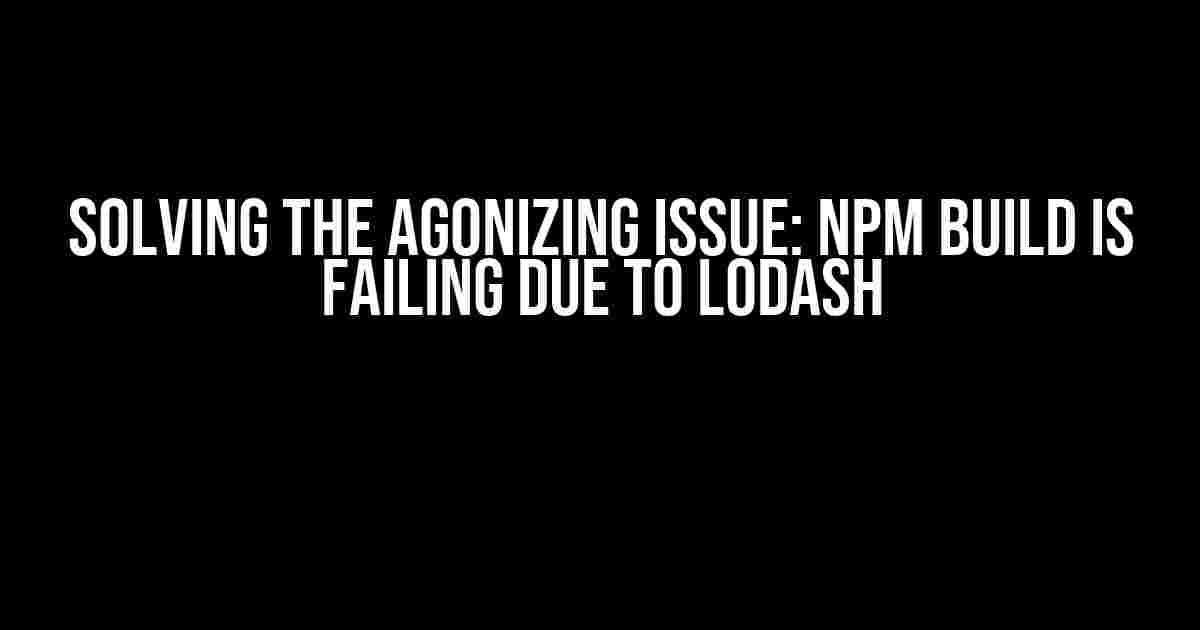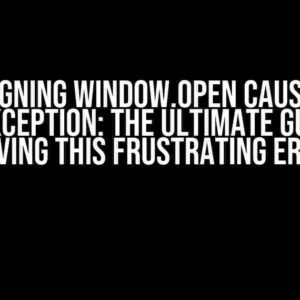If you’re reading this, chances are you’re stuck in a frustrating situation where your npm build process is failing due to the infamous Lodash issue. Fear not, dear developer, for we’ve got you covered! In this comprehensive guide, we’ll delve into the reasons behind this error, and more importantly, provide you with step-by-step solutions to get your build process up and running in no time.
What’s Causing the Fuss?
Lodash, a popular JavaScript utility library, has been identified as the culprit behind this error. But why, you ask? There are a few reasons why Lodash might be causing your npm build to fail:
-
Incompatible Versioning
Lodash has undergone significant changes in recent versions, which might be causing compatibility issues with your project. Perhaps you’ve updated Lodash without updating your project’s dependencies, or vice versa.
-
Dependency Conflicts
When multiple dependencies rely on different versions of Lodash, it can lead to conflicts and ultimately, a failed build.
-
Incorrect Installation
If Lodash wasn’t installed correctly or wasn’t properly linked, it can prevent your build process from completing successfully.
Let’s Get Down to Business: Troubleshooting Steps
Now that we’ve identified the potential causes, it’s time to tackle the issue head-on. Follow these steps to resolve the npm build failure caused by Lodash:
-
Check Your Lodash Version
Run the following command in your terminal to check the installed version of Lodash:
npm ls lodashTake note of the version number, as we’ll need it later.
-
Update Lodash to the Latest Version
Try updating Lodash to the latest version using the following command:
npm install lodash@latestThis might resolve any compatibility issues or conflicts.
-
Check for Dependency Conflicts
Run the following command to identify any dependency conflicts:
npm ls --depth 0This will display a list of your project’s dependencies. Look for any duplicates or conflicting versions of Lodash.
-
Resolve Dependency Conflicts
If you’ve identified conflicts, try resolving them by installing the correct version of Lodash for each dependent package:
npm install@ lodash@ Replace
and with the actual package name and version number. -
Reinstall Lodash and Dependencies
If the above steps didn’t work, try reinstalling Lodash and its dependencies:
npm uninstall lodash
npm install lodash@Replace
with the correct version number from step 1. -
Delete the node_modules Directory
As a last resort, try deleting the entire node_modules directory and reinstalling your dependencies:
rm -rf node_modules
npm installThis will remove any corrupted or incorrectly installed packages.
Common Issues and Fixes
We’ve covered the general troubleshooting steps, but sometimes, you might encounter specific issues that require tailored solutions. Here are a few common problems and their fixes:
| Issue | Fix |
|---|---|
| Error: “Cannot find module ‘lodash'” | Run npm install lodash to reinstall Lodash. |
| Error: “Lodash is not defined” | Check your import statement; ensure it’s correct and imported correctly. For example: import _ from 'lodash'; |
| Error: “Conflict: Multiple versions of Lodash detected” | Resolve the conflict by installing the correct version of Lodash for each dependent package (as described in step 3). |
Conclusion
With these troubleshooting steps and solutions, you should be able to resolve the npm build failure caused by Lodash. Remember to stay calm, patient, and methodical in your approach. If you’ve followed all the steps and still encounter issues, consider seeking help from your development community or reaching out to the Lodash maintainers for guidance.
console.log("npm build is no longer failing due to Lodash!");
console.log("You did it!");
Pat yourself on the back, dear developer, for conquering this pesky issue! Now, go forth and build amazing things with confidence.
Here are 5 Questions and Answers about “npm build is failing due to lodash” in HTML format:
Frequently Asked Question
Get the solutions to your npm build woes caused by lodash!
Why is my npm build failing due to lodash in the first place?
Lodash is a popular JavaScript utility library, but sometimes its version can conflict with other dependencies in your project, causing the build to fail. This might be due to differences in ES module syntax, compatibility issues, or even a simple version mismatch.
How do I check which version of lodash is causing the issue?
Run `npm ls lodash` in your terminal to check which version of lodash is installed in your project. This command will display a tree-like structure showing the version of lodash and its dependencies. Look for any version inconsistencies or conflicts that might be causing the build to fail.
Can I simply update lodash to the latest version to fix the issue?
Not always! While updating to the latest version might resolve the issue, it’s essential to ensure that the updated version is compatible with your project’s dependencies. You can try running `npm install lodash@latest` or `yarn add lodash@latest` to update lodash. However, if you’re using a specific version of lodash for a reason, updating might break other parts of your project.
What if I’m using a monorepo or a complex project structure?
In a monorepo or complex project structure, you might need to dive deeper to identify the root cause of the issue. Try running `npm ls lodash` or `yarn why lodash` to understand the dependency graph better. You might need to update or patch specific dependencies or adjust your build configuration to resolve the conflict.
Are there any long-term solutions to avoid such issues in the future?
Yes! To avoid similar issues in the future, consider using a consistent version of lodash across your project by specifying it in your `package.json` file. You can also use tools like `yarn workspaces` or `lerna` to manage dependencies in a monorepo. Additionally, regularly run `npm audit` or `yarn audit` to identify and fix potential security vulnerabilities.


